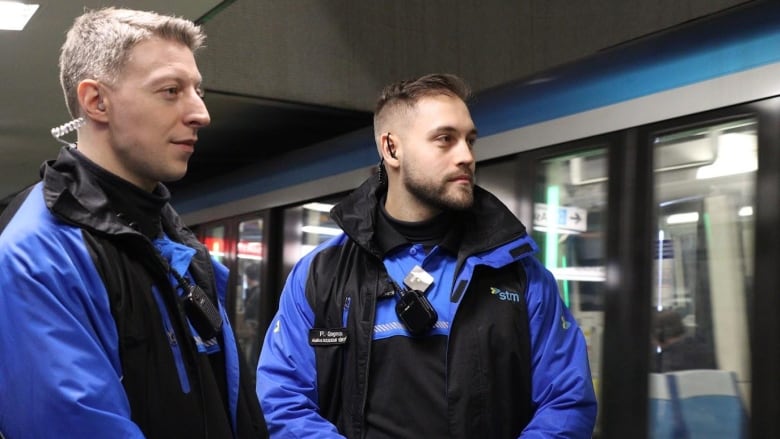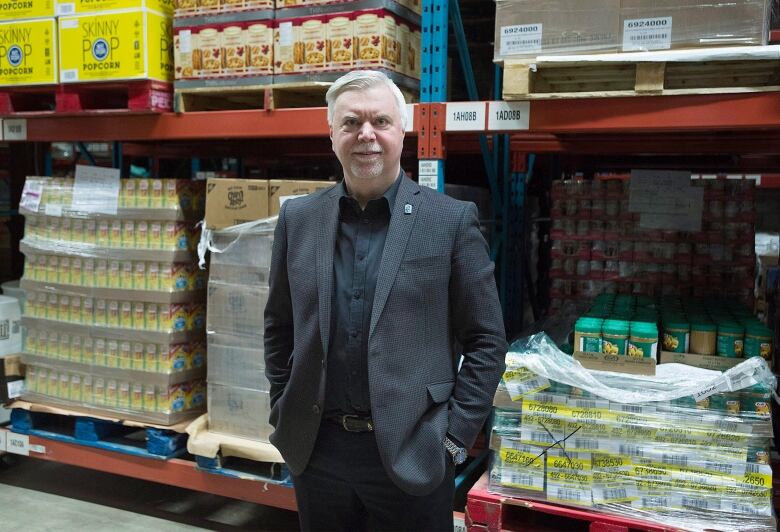Safety ambassadors begin patrolling Montreal's Metro stations to beef up security
STM wants 20 safety ambassadors by spring 2024

Philippe Gagnon makes the rounds at Place-des-Arts Metro station. He's one of the six safety ambassadors who started this month, a new position created by the city to increase security in Montreal's Metro stations. The Socit de transport de Montral (STM) plans to have 20 safety ambassadors patrolling its stations by this spring.
"We're more boots on the ground, basically, for all the help people might need," said Gagnon, whose utility belt holdsNarcan, a nasal spray that can be administered to people overdosing.
Often, that means helping people understand how to get to their destination or buy tickets. Other times, he says that means speaking with vulnerable people and directing them to a place to spend the night or take a shower. If necessary, he can call on a special constable, police officer or outreach worker.
At a news conference on Thursday morning, STM board chair ric Alan Caldwellsaid the safety ambassadors are a necessary long-term componentof Montreal's plan toadapt to what he callsa "new reality."
"Since the end of the pandemic, the social context has really changed in the Metro," he said.
According to STM security director Jocelyn Latulippe, there were 47,000 incidentreports in 2023. That number has been steadily rising: there were42,000 reports and interventions in 2022, 35,622 in 2021 and 31,628 in 2020.
WATCH| A Montreal Metro safety ambassador describes his job:
Latulippe said there are "many reasons" behind the increase with the "social environment is evolving at a really fast pace."
The safety ambassadors, he said, "may be considered our eyes and ears into our stations," and will support both users and other security personnel.
The STM plans to spend $5 million in 2024 on security, including $600,000 on safety ambassadors.
The safety ambassadors receive 80 hours of training, mostly focused on security. Their base salary is $22 per hour.
Safety ambassadors, said Latulippe, are part of a multi-pronged security approach that also involves teams of outreach workers, special constables and police officers, and the ambassadors allow for more rapid response for interventions.
The STM has added 16 new special constables since last December, bringing the total number to 200 constables.
In addition, eight workers from the quipe mobile de mdiation et d'intervention sociale (EMMIS), a team of intervention workers who respond to conflicts or other issues people in precarious living situations, will provide support to the STM.

A shift in approach, but still a patch, homeless organization says
Sam Watts, CEO of Welcome Hall Mission, says the use of safety ambassadors signals a shift in approach when it comes to the way the STM deals with the unhoused, a change he attributes to a necessity because of the larger numbers of people experiencing homelessness in Montreal and seeking shelter in its Metro stations.
Only a few years ago, he says, people experiencing homelessness were locked out of Metro stations and removed from their entrances, even in the extreme cold.
Watts says that STM workers need to be trained to connect people in need with the right organizations that will respond to their emergency needs.
At the same time, Watts believes that adding more employees still misses the mark.
"Instead of spending a lot of money on patches, what we really should be doing is figuring out ways to help people get back into housing, so that they're not in the Metro in the first place," he said.
Growing security apparatus in Montreal's Metro stations
Concordia University professor Ted Rutland, who helped write a critical report on mixed squads dealing with the unhoused in 2023, says that in the span of a few years the STM has massively increased its security apparatus, which includes special constables carrying weapons and pepper gel, and mixed squads, who he says are more focused on protecting property than people.
"It makes it seem like we are going to war or there's already a war," he said.
Increasing security ignores the issue of homelessnessand wastesvaluable resources that could otherwise have been allocated to addressthe growing issue of homelessness, says Rutland.
"You could send in 1,000 more cops. The issue remains that some people have nowhere to go, and that especially in the cold, this is the best place to go."
Rutland also has doubts that safety ambassadors will do much in the way of increasing feelings of safety for the most vulnerable. The needs of marginalized people including their safety needs should be made a priority, he said, but instead they are commonly viewed asthreats to public safety.
with files from Radio-Canada













_(720p).jpg)


 OFFICIAL HD MUSIC VIDEO.jpg)
.jpg)



























































































